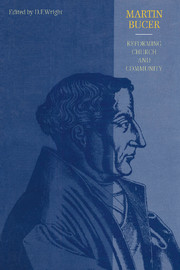Book contents
- Frontmatter
- Contents
- Notes on contributors
- List of abbreviations
- Introduction
- 1 Martin Bucer and the Old Church
- 2 The relation between church and civil community in Bucer's reforming work
- 3 Bucer's influence on Calvin: church and community
- 4 The church in Bucer's commentaries on the Epistle to the Ephesians
- 5 Church, communion and community in Bucer's commentary on the Gospel of John
- 6 Eucharistic communion: impulses and directions in Martin Bucer's thought
- 7 Martin Bucer and the ministry of the church
- 8 Infant baptism and the Christian community in Bucer
- 9 Bucer's ecclesiology in the colloquies with the Catholics, 1540–41
- 10 The Strasbourg Kirchenpfleger and parish discipline: theory and practice
- 11 Ecclesiological motifs behind the creation of the ‘Christlichen Gemeinschaften’
- 12 Martin Bucer in England
- 13 Martin Bucer and the Englishing of the Psalms: pseudonymity in the service of early English Protestant piety
- Bibliography
- Biblical index
- Index of Bucer's works
- Index of modern authors
- General index
4 - The church in Bucer's commentaries on the Epistle to the Ephesians
Published online by Cambridge University Press: 22 September 2009
- Frontmatter
- Contents
- Notes on contributors
- List of abbreviations
- Introduction
- 1 Martin Bucer and the Old Church
- 2 The relation between church and civil community in Bucer's reforming work
- 3 Bucer's influence on Calvin: church and community
- 4 The church in Bucer's commentaries on the Epistle to the Ephesians
- 5 Church, communion and community in Bucer's commentary on the Gospel of John
- 6 Eucharistic communion: impulses and directions in Martin Bucer's thought
- 7 Martin Bucer and the ministry of the church
- 8 Infant baptism and the Christian community in Bucer
- 9 Bucer's ecclesiology in the colloquies with the Catholics, 1540–41
- 10 The Strasbourg Kirchenpfleger and parish discipline: theory and practice
- 11 Ecclesiological motifs behind the creation of the ‘Christlichen Gemeinschaften’
- 12 Martin Bucer in England
- 13 Martin Bucer and the Englishing of the Psalms: pseudonymity in the service of early English Protestant piety
- Bibliography
- Biblical index
- Index of Bucer's works
- Index of modern authors
- General index
Summary
The differences between the various editions of Bucer's commentaries on the Synoptic Gospels have long been a source of interest. They have been used, often uncritically, to show the changes or developments in his theology between 1527–8,1530 and 1536. By contrast his commentaries on Ephesians have been neglected.
Bucer lectured on the Pauline Epistles in Strasbourg in the 1520s and in 1527 published a commentary on Ephesians. He lectured on Ephesians again in Cambridge in 1550–1 and notes of these lectures were published, after his death, in 1562. It is in fact remarkable that after his early biblical commentaries (on the Gospels, Ephesians, St John, Zephaniah and the Psalms) in the years 1527 to 1529, Bucer published no other commentary except on Romans in 1536 and on Judges. Yet on Ephesians there are two commentaries, even if one was published from his notes after his death.
Among reasons for choosing one book rather than another as the subject for lectures or exposition are the needs or concerns of the listener or the lecturer. For example, in Zurich in the 1520s Zwingli preached on the books in the New Testament which he saw as meeting the situation in Zurich and the needs of the people there.
The concerns of the hearer or situation are clear in both of Bucer's commentaries on Ephesians, especially in the second. But Bucer's own concerns and emphases are also evident.
- Type
- Chapter
- Information
- Martin BucerReforming Church and Community, pp. 45 - 60Publisher: Cambridge University PressPrint publication year: 1994
- 4
- Cited by



